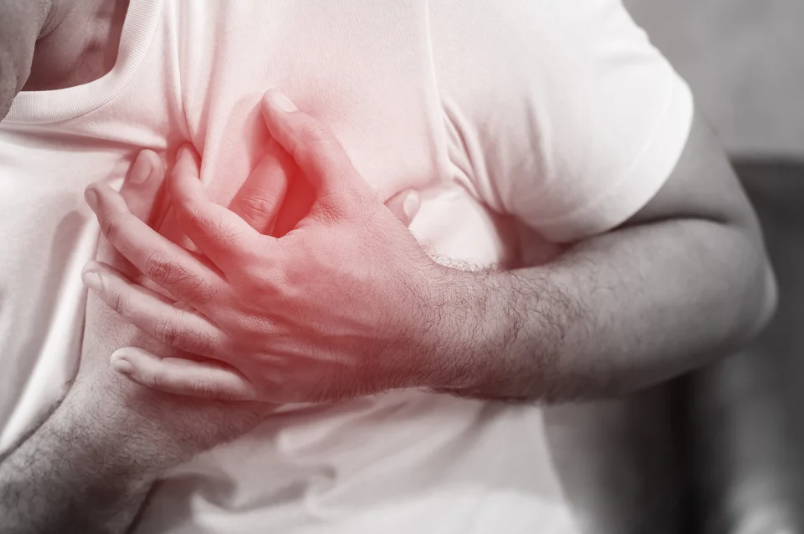Heart Health
Understanding Chest Pains: When to Seek Medical Attention
Chest discomfort can be a frightening and distressing symptom, and it’s critical to understand when it requires medical attention and when it’s not serious.
While chest pain may indicate a heart attack, there are numerous other possible causes, including muscle strain, acid reflux, and worry. Understanding the various types of chest discomfort and its associated symptoms will help you decide whether or not to seek medical assistance.
The accompanying symptoms are one of the most significant factors to consider when experiencing chest pain. For example, chest pain coupled by shortness of breath, perspiration, nausea, or pain in the arms or jaw may indicate a heart attack and necessitate prompt medical intervention. Chest discomfort that is severe and limited to a single place, or that is provoked by a specific movement or activity, is more likely to be caused by a less serious ailment such as muscle strain or acid reflux.
If you have chest pain and are unsure whether it is serious, it is always best to be cautious and seek medical assistance. A doctor can conduct tests and exams to discover the source of your chest pain and recommend suitable treatment. Remember that chest pain might indicate a serious ailment, so always treat it carefully and get medical attention if you are concerned.

Recognizing Serious Chest Pain
Chest pain can be a sign of a number of different diseases, some of which are serious and necessitate rapid medical attention. Knowing how to spot severe chest pain might help people seek immediate medical attention and avoid possibly fatal complications.
Symptoms of a Heart Attack
Heart attacks are among the most dangerous causes of chest pain. Recognizing the symptoms of a heart attack is critical, as early treatment can save lives. Common symptoms of a heart attack are:
- Pain, pressure, discomfort, or tightness in the chest that lasts more than a few minutes or comes and goes
- Pain or discomfort in other parts of the upper body, like the arms, neck, back, or jaw.
- Symptoms include shortness of breath, lightheadedness, nausea, and sweating.
Fatigue or Weakness
It is crucial to note that not everyone has these symptoms during a heart attack, and some people may have unusual symptoms such as burning or indigestion-like pain. If a person develops any of these symptoms, they should seek emergency medical assistance.
Differentiating Heart-Related and Non-Heart-Related Pain
Not all chest pain stems from heart disease. Other causes of chest pain include muscle strain, acid reflux, and worry. However, certain aspects of chest pain can assist distinguish between heart-related and non-heart-related pain. For example, heart-related discomfort is frequently described as a pressure or tightness in the chest that might spread to other parts of the body. It may also be associated with shortness of breath, sweating, or nausea. Non-heart-related chest pain is commonly described as a sharp or burning sensation that can be confined to a specific place and is sometimes eased by shifting positions or taking medicine.
Other dangerous illnesses that can cause chest pain are aortic dissection and pulmonary embolism. Aortic dissection is a rip in the inner layer of the aorta that causes significant chest pain that can spread to the back. A pulmonary embolism is a blood clot in the lungs that causes chest pain, loss of breath, and bloody cough.
To summarize, detecting severe chest pain can help people seek immediate medical assistance and avoid possibly fatal complications. If a person has signs of a heart attack or another dangerous ailment, they should seek emergency medical assistance.

When to Seek Medical Attention
Chest pain may signify a serious ailment, therefore it is vital to know when to get medical attention. Here are some guidelines to follow:
Immediate Actions for Acute Chest Pain
If someone experiences sudden, acute chest discomfort, they should call 911 or seek emergency medical attention straight once. Chest pain along with any of the following symptoms may indicate a heart attack or other serious condition, demanding immediate medical intervention.
- Shortness of breath.
- Sweating
- Nausea or vomiting.
- Pain can move to the arm, neck, jaw, or back.
- dizziness or lightheadedness.
- Loss of consciousness.
Consult a Healthcare Provider
If your chest pain is not severe but persists or recurs, consult a doctor. A primary care physician or cardiologist can help diagnose the cause of the chest pain and recommend appropriate treatment.
To determine the underlying cause of chest discomfort, the healthcare professional may perform a physical examination, order imaging tests, or propose additional diagnostic treatments. Depending on the diagnosis, the healthcare expert may suggest medications, lifestyle changes, or other treatments to alleviate chest pain and prevent recurrences.
To recap, if someone experiences sudden, severe chest pain or chest pain combined with other symptoms, they should call 911 or seek emergency medical attention right once.

Common Causes of Chest Pain
Chest pain can be caused by a wide range of conditions, from minor to severe. In rare circumstances, chest pain may indicate a dangerous underlying illness requiring quick medical intervention. In this part, we’ll talk about some of the most prevalent reasons of chest pain.
Cardiac and Non-Cardiac Origins
Chest pain can be either cardiac or non-cardiac in origin. Cardiac chest discomfort is mainly caused by a blockage in the coronary arteries, which prevents blood flow to the heart. Anxiety, panic attacks, and acid reflux are all potential causes of non-cardiac chest pain.
Gastrointestinal and Musculoskeletal Causes
Gastrointestinal reasons of chest pain include heartburn, acid reflux, and GERD. These disorders can produce a burning sensation in the chest, which can be misinterpreted for cardiac chest pain. Musculoskeletal reasons of chest discomfort may include a pulled chest muscle, a broken rib, or chest muscle inflammation. These illnesses can produce acute or dull chest pain that worsens with movement or breathing.
Chest pain can also be a sign of more serious illnesses such as a blood clot, pneumonia, asthma, infections, coronary artery disease, lung infections, esophageal spasm, gastroesophageal reflux disease, or ulcers. If you have severe chest discomfort that lasts longer than a few minutes or is accompanied by other symptoms like shortness of breath, dizziness, or nausea, get medical attention right once.

Diagnosis and Treatment of Chest Pain
Tests and Diagnosis Procedures
When someone feels chest pain, they should seek medical assistance immediately. The American Heart Association advises calling 911 or going to the emergency department immediately if chest discomfort lasts more than a few minutes, is accompanied by perspiration, shortness of breath, or nausea, or feels like pressure or squeezing in the chest.
To diagnose chest discomfort, a healthcare provider will inquire about the patient’s medical history, symptoms, and do a physical examination. They may also request diagnostic procedures including an electrocardiogram (ECG or EKG), blood tests, a chest X-ray, an echocardiography, a stress test, or an angiography.
An electrocardiogram (ECG or EKG) is a fast test that detects electrical activity in the heart. Electrodes are sticky patches that are implanted on the chest, arms, and legs. Wires link the electrodes to a computer, which records the electrical signals from the heart. An electrocardiogram (ECG) can assist discover heart issues that are causing chest pain.
Treatment Options and Lifestyle Changes
The treatment for chest pain is determined on its underlying cause. If the chest pain is caused by a heart attack, the patient may require emergency treatment, such as clot-busting medication or angioplasty, to restore blood flow to the heart. If the chest pain is caused by something else, treatment options could include drugs, lifestyle modifications, or surgery.
To relieve chest pain, doctors may prescribe nitroglycerin, aspirin, or beta-blockers. Nitroglycerin relaxes the blood arteries, which increases blood flow to the heart. Aspirin helps to minimize blood clotting, which improves blood flow to the heart. Beta-blockers assist slow the heart rate and lower blood pressure, reducing the burden on the heart.
To prevent chest pain, make lifestyle changes such as stopping smoking, eating a balanced diet, exercising regularly, reducing stress, and treating high blood pressure and diabetes. In some circumstances, surgery may be required to address the root cause of chest pain.
To summarize, chest discomfort can be an indication of a dangerous medical issue, and it is critical to seek medical assistance right once if it lasts longer than a few minutes or is accompanied by further symptoms. An electrocardiogram (ECG or EKG) is a diagnostic test that can assist diagnose heart issues that cause chest pain. Depending on the origin of the chest pain, treatment options may include medication, lifestyle modifications, or surgery.
Conclusion
Finally, if you are feeling chest pain, you should prioritize your health and seek medical attention. It is safer to err on the side of caution and have a doctor do tests and exams to establish the source of the pain. Remember that chest pain can be a sign of a serious ailment, so handle it with caution and seek medical help immediately if you have any concerns.
Trusted Health, Wellness, and Medical advice for your well-being



